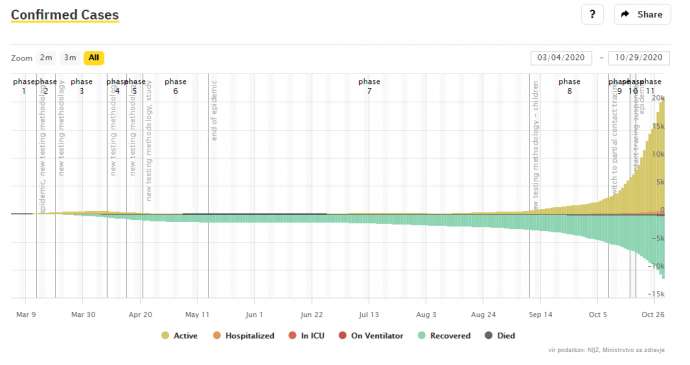STA, 30 October 2020 - Slovenia recorded 1,798 infections on a slightly scaled-down testing on Thursday, and another 23 fatalities among patients with Covid-19, the highest daily death toll yet, data from the government show.
Jump to restrictions extended or no light at the end of the tunnel
A total of 6,368 tests were performed in Slovenia yesterday, just over a thousand fewer than the day before, when 2,488 came back positive. This means that the positivity rate fell to 28.23% from almost 35%.
Hospitalisations have risen to 703, from 660 the day before, and the number of patients requiring intensive care increased by 13 to 122, putting a further strain on hospitals. On the positive side, forty patients were discharged home yesterday.
With another 23 fatalities, the national Covid-related death toll has risen to 315.
The latest cases bring Slovenia's case count to 32,503 and the number of active cases to 20,980, while the rolling 14-day average has increased to 1,001 per 100,000 residents, according to tracker site covid-19.sledilnik.org.
Commenting on the latest figures, Health Ministry State Secretary Tina Bregant said it was an "indication that the effect of the measures has kicked in".
However, despite the fall in the test positivity rate, she said the rate was still "extremely high" so it was essential for everyone to keep sticking to the restrictions, which the government has extended for another week, for the country to come out of the woods.
She said the slow-down in the outbreak was not sufficient yet, while the real indication of when the effect of lockdown restrictions kicked in, would be when the situation began to improve in hospitals.
Thanking the hard-working health staff and everyone involved in the effort, she said they needed "all the support we can give them" as she appealed to everyone to bear with the restrictions and projected a "few more difficult days ahead".
She would not say whether the extension of measures for a week would be enough, appealing for patience, which she said turned out to be as important as quick action in response to the pandemic.
Similarly, government spokesman Jelko Kacin said there was a "key race against the time" in hospitals at the moment as capacities are being expanded to be able to admit an expected surge in Covid-19 patients and save lives.
He said it was too early to say the situation was stabilising, so it was essential that people should stay at home and avoid any socialising whatsoever.
Most anti-corona restrictions extended by a week, some by two weeks
STA, 30 October 2020 - The government has extended key measures designed to curb the spread of the coronavirus epidemic in line with its policy of periodically checking the efficacy of measures based on input by an expert task force for coronavirus.
Most notably, store closures and the six-person ceiling for gatherings have been extended by a week. Mandatory masks in indoor and outdoor public spaces and mandatory use of hand sanitizers have been extended by two weeks.
The decision was made by the government at a correspondence session on Friday.
Chief epidemiologist does not see light at the end of the tunnel yet
STA, 30 October 2020 - Mario Fafangel, the head of the infectious diseases centre at the National Institute of Public Health, has warned in a televised interview that Slovenia is not out of the woods yet, even though coronavirus figures for Thursday might be lower than in the past two days.
In Thursday's interview with Odmevi, the late night news show on TV Slovenija, Fafangel commented on fresh figures showing that by late evening the number of positive tests had been at around 1,100 after over 2,600 on Tuesday and just below 2,500 on Wednesday, but he said the figure was not one that should make headlines.
"It could be that the figures are down even when an epidemic is in full swing. They fall because testing capacities have been exceeded, which has happened with us; because the testing protocol is changed, which has happened with us. People may take fright and don't get tested when their symptoms are still mild. So it would be a bit too early to talk of a light at the end of the tunnel," he said.
However, he said the headline making news today was no longer the daily figure, but rather the news was that people should stay at home, work from home, whenever possible. "Let's be in the bubble with our dearest, those without whom life wouldn't be worthwhile anyway. That's the news."
Fafangel agreed with the host that there was optimism in the Jožef Stefan Institute's projection yesterday that Covid-19 hospitalisations could fall after 4 November and intensive care numbers after 10 November if people stay at home.
Commenting on a rapid increase in infections among 35-45-year-olds and among teens, Fafangel said it reflected the spread of the virus within the most active groups of population, but it was good news epidemiologically in that it meant the older, most vulnerable group of population was being well protected, which was also evident from the number of fatalities.
Slovenia ranks 7th in the EU by the rolling 14-day average per 100,000 residents, at 1,230, while it places 16th by the number of deaths among patients with Covid-19, at 138 per million.
The incidence number says that no European country has been successful in grappling with the virus, says Fafangel, but he sees "something positive" in the fatality figure: "In the first wave we defended ourselves well, we're defending ourselves well this time, that is protecting the population most at risk."
He said that the National Institute of Public Health had joined the EUROMOMO portal that makes estimates on excess deaths on a weekly basis with the latest data for week 43 showing that Slovenia does not have a typical excess of deaths.
All stories on Slovenia and coronavirus







